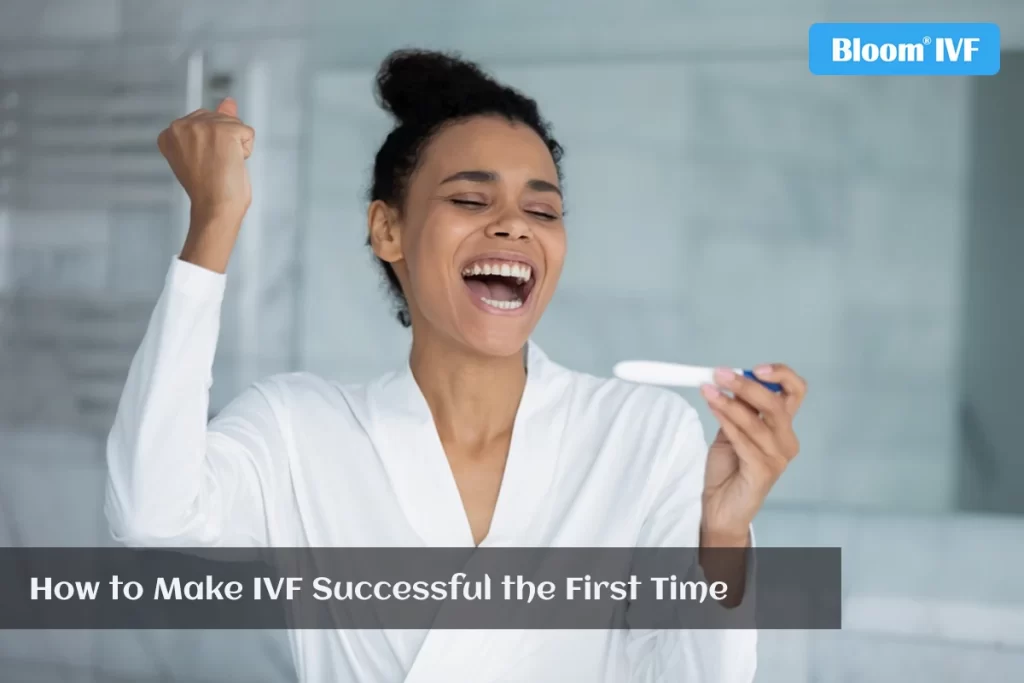How to Make IVF Successful the First Time: Step-by-Step Information
In Vitro Fertilization (IVF) is a transformative fertility treatment that has helped countless couples achieve their dream of parenthood. However, given the emotional, physical, and financial investment that IVF requires, many couples are eager to know how to make IVF successful the first time. While success rates vary based on individual circumstances, certain factors can significantly improve your chances. In this blog, we’ll discuss actionable steps to boost your odds of success, explore the role of fertility clinics, and answer key questions, such as what is IVF cost in India.

1. Choose the Right Fertility Clinic
One of the most critical steps in ensuring a successful IVF treatment is selecting the right fertility clinic like Bloom IVF. Not all clinics are the same, and the experience, technology, and expertise of the clinic can greatly influence your chances of success.
- Clinic Expertise: Research clinics with high success rates and experienced fertility specialists. A reputable clinic will provide you with transparent data about their success rates, particularly for patients in your age group and with similar fertility issues.
- Technology and Resources: Advanced technology like time-lapse imaging for embryo selection or genetic testing can improve the chances of selecting the best embryo, which in turn can lead to higher pregnancy rates.
- Support and Counseling: A good clinic will offer emotional support and counseling throughout the IVF process, helping you cope with the physical and emotional stresses.
2. Optimize Your Health Before IVF Treatment
Your physical health plays a major role in the success of IVF fertility treatment. Making positive lifestyle changes can have a direct impact on your fertility and the outcome of the procedure.
- Maintain a Healthy Weight: Being overweight or underweight can affect hormone balance and reduce IVF success rates. Achieving a healthy BMI before starting IVF can increase your chances of success.
- Balanced Diet: Consuming a nutrient-rich diet that includes fruits, vegetables, lean proteins, and whole grains can improve egg quality and overall reproductive health.
- Avoid Smoking and Alcohol: Both smoking and alcohol can harm egg quality and reduce the chances of successful implantation. It’s recommended to quit smoking and limit alcohol intake before and during the treatment.
- Manage Stress: IVF can be a stressful journey, but managing stress through techniques like yoga, meditation, or counseling can improve both your mental well-being and fertility.
3. Follow Your Doctor’s Protocol Diligently
Once you begin the IVF process, it’s essential to follow your doctor’s instructions closely. This includes taking medications on time, attending all monitoring appointments, and adhering to lifestyle recommendations from your fertility specialist.
- Medications: Hormonal medications are used to stimulate egg production and prepare your body for embryo transfer. Skipping or mistiming doses can negatively affect your treatment.
- Monitoring: Regular monitoring through blood tests and ultrasounds is crucial to assess your body’s response to the treatment. Attending all scheduled appointments will ensure that the treatment is adjusted as needed to improve the chances of success.
4. Embryo Selection and Transfer
One of the most critical stages in IVF is the selection and transfer of the embryo. Fertility clinics with advanced technologies for embryo monitoring and selection tend to have higher success rates.
- Embryo Grading: Clinics often grade embryos based on their quality. Higher-quality embryos are more likely to result in successful pregnancies.
- Genetic Testing (PGT): Preimplantation genetic testing (PGT) can identify embryos that are free from genetic disorders, further improving the chances of implantation and a healthy pregnancy.
5. Rest and Recovery After Embryo Transfer
The period after the embryo transfer is crucial for implantation. While there’s no need for complete bed rest, following some simple guidelines can help create the best environment for the embryo to implant.
- Rest Moderately: Avoid strenuous activities, but don’t stay inactive. Light walking is beneficial for circulation, but it’s important to avoid heavy lifting and intense workouts.
- Follow Dietary Advice: After embryo transfer, continue eating a nutritious diet that supports your overall health.
- Manage Anxiety: The waiting period can be emotionally challenging, but it’s important to stay calm and positive. Practice relaxation techniques, and stay engaged with supportive friends or family.
6. Understand the IVF Cost in India
The financial aspect is a major concern for many couples. The cost of IVF in India typically ranges from ₹1,20,000 to ₹3,00,000 per cycle, depending on the fertility clinic, location, and any additional treatments required. While IVF treatment in India is more affordable than in many Western countries, it’s still a significant investment.
- Factors Affecting Cost: The number of IVF cycles required, additional treatments like ICSI (Intracytoplasmic Sperm Injection), and preimplantation genetic testing (PGT) can increase the overall cost.
- Financial Planning: Many fertility clinics offer payment plans or financing options to help couples manage the cost of IVF treatment.
Conclusion
While there are no guarantees with IVF treatment, taking the right steps can increase your chances of success the first time. Choosing a reputable fertility clinic, such as Bloom IVF, optimizing your health, following your doctor’s advice, and understanding the IVF process can all contribute to a successful outcome. Additionally, being aware of the IVF cost in India and planning accordingly will help reduce financial stress during your fertility journey. By staying informed, prepared, and proactive, you can improve your chances of how to make IVF successful the first time.
Frequently Asked Question (FAQs)
How to make my IVF successful?
To increase your chances of IVF success, choose a reputable fertility clinic, maintain a lifestyle, follow your doctor’s recommendations, and healthy stay informed about the IVF process.
Is IVF successful with blocked tubes?
Yes, IVF can be successful with blocked tubes, as the procedure bypasses the fallopian tubes by fertilizing eggs outside the body.
How to make the first attempt IVF successful?
To improve the chances of a successful first attempt at IVF, ensure thorough pre-treatment evaluations, optimize your health, and work closely with an experienced fertility specialist.
Is IVF successful with endometriosis?
Yes, IVF can be successful for women with endometriosis. The treatment often helps overcome fertility challenges associated with the condition.
What makes IVF successful?
IVF success is influenced by factors such as the clinic’s expertise, the quality of the embryos, the woman’s age, overall health, and adherence to medical advice.
Is IVF successful with PCOS?
Yes, IVF can be successful for women with PCOS (Polycystic Ovary Syndrome). Proper management of the condition can enhance fertility outcomes during treatment.

